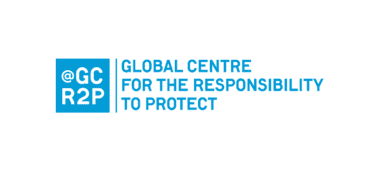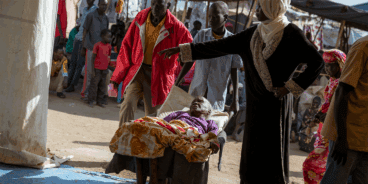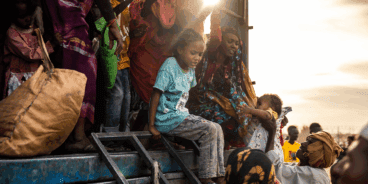
Atrocity Alert No. 131: Myanmar (Burma), Iraq and Somalia
Atrocity Alert is a weekly publication by the Global Centre for the Responsibility to Protect highlighting situations where populations are at risk of, or are enduring, mass atrocity crimes.
Forced repatriation of Rohingya refugees
Following a bilateral agreement between the governments of Myanmar (Burma) and Bangladesh, the repatriation of more than 2,000 Rohingya refugees back to Myanmar is due to begin tomorrow, 15 November. The decision has been widely criticized as it places returnees at extreme risk of further persecution, and was taken without the consent of either the UN Refugee Agency (UNHCR) or Rohingya refugee organizations. Forced repatriation under such conditions violates the principle of non-refoulement enshrined in the 1951 Refugee Convention, and would be both immoral and illegal.
According to the UN Human Rights Council-mandated Independent International Fact-Finding Mission (FFM) on Myanmar, military operations launched in Rakhine State by Myanmar’s security forces during 2017 were conducted with “genocidal intent,” including a premeditated plan for the destruction of Rohingya communities. Following the widespread killing of Rohingya civilians and the burning of nearly 400 villages, over 720,000 people fled the country, bringing the number of Rohingya refugees in Bangladesh to more than 900,000.
The UN High Commissioner for Refugees has urged the governments of Myanmar and Bangladesh to halt plans for repatriation. According to the UN Special Rapporteur on the situation of human rights in Myanmar, Yanghee Lee, the government of Myanmar has failed to take any “concrete and visible measures” to create conditions necessary for safe and dignified returns, including granting members of the Rohingya ethnic minority “a right to citizenship, freedom of movement, and access to services, health, education and livelihoods.”
There have been numerous reports of Rohingya families fleeing refugee camps to avoid repatriation, and at least two refugees have attempted suicide after hearing that their families might be forced to return to Myanmar. In a statement calling for a halt to repatriation plans, the UN High Commissioner for Human Rights, Michelle Bachelet, emphasized that “we are witnessing terror and panic among those Rohingya refugees in Cox’s Bazar who are at imminent risk of being returned to Myanmar against their will.”
The governments of Myanmar and Bangladesh should immediately suspend all plans for Rohingya repatriation until UNHCR has determined that the appropriate conditions are in place. It is essential that any repatriation of refugees be conducted on a strictly voluntary basis, in accordance with international law and the principle of non-refoulement.
Justice remains elusive as more mass graves are discovered in Iraq
On 6 November the UN Assistance Mission in Iraq (UNAMI) and the Office of the High Commissioner for Human Rights (OHCHR) published a joint report confirming the discovery of 202 mass grave sites, holding between 6,000 and 12,000 bodies, in areas that were under the control of the so-called Islamic State of Iraq and the Levant (ISIL) between 2014 and 2017. The report emphasizes that further graves are likely to be found as populations under ISIL’s control suffered widespread and systematic violations of human rights, amounting to war crimes, crimes against humanity and genocide.
Next Tuesday, 21 November, will mark one year since the government of Iraq announced the end of major anti-ISIL military operations. Nevertheless, ISIL continues to carry out sporadic attacks, leaving civilians – in particular vulnerable ethnic and religious minorities such as Yazidi, Christian, Shabak and Turkmen, as well as members of the majority Shia population – at ongoing risk of atrocities. Most recently, on 9 November a suspected ISIL car bomb in Mosul killed six people.
Despite the UN Security Council establishing the UN Investigative Team for Accountability of Da’esh (UNITAD) in September 2017, justice for victims and survivors of ISIL atrocities remains elusive. While hundreds of suspected ISIL members have been prosecuted in domestic courts on charges of terrorism, no one has yet been held accountable for the perpetration of war crimes, crimes against humanity or genocide.
On 24 October Iraq’s new Prime Minister, Adel Abdul-Mahdi, was sworn into office. The new government should propose the adoption of legislation incorporating genocide, war crimes and crimes against humanity into Iraqi domestic law. The international community should assist Prime Minister Abdul-Mahdi by supporting the operations of UNITAD, providing financial and technical assistance, and helping ensure that all ISIL perpetrators face justice for atrocities committed against the Iraqi people.
Al-Shabaab targets civilians and medical personnel in Somalia
On Friday, 9 November, at least 50 people were killed in Mogadishu as four bombs exploded outside the Sahafi Hotel, located near the government’s Criminal Investigations Department. The fourth bomb was detonated as medical personnel were arriving to treat the wounded. The attack, claimed by the armed extremist group Al-Shabaab, marked their deadliest assault on civilians since over 500 people were killed in a bombing on 14 October 2017.
In recent months Somalia has witnessed an increase in armed hostilities between government forces and Al-Shabaab. UNHCR has estimated that over 21,000 people were displaced during October due to renewed fighting and insecurity. Al-Shabaab, which is seeking to overthrow the Somali Federal Government, has previously committed systematic violations of international humanitarian and human rights law in territory under its control, including torture, attacking hospitals and schools, recruiting child soldiers and deliberately targeting civilians. These violations may amount to war crimes or crimes against humanity.
Upcoming elections in Somalia’s South West State, scheduled for 17 November, could provide a potential focus for more attacks by Al-Shabaab. On 7 November the UN Secretary-General’s Special Representative for Somalia, Nicholas Haysom, emphasized that “there is a real need to set the precedent for credible and peaceful electoral processes.”
The Somali Federal Government, with the support of the UN and the African Union, must take immediate steps to ensure a credible, transparent and peaceful electoral process can take place. International partners should continue to support efforts aimed at defeating Al-Shabaab and enhancing national governance, as well as protecting and promoting the human rights of all Somalis.
Related Publications


Atrocity Alert No. 462: Sudan, Haiti and Mozambique
